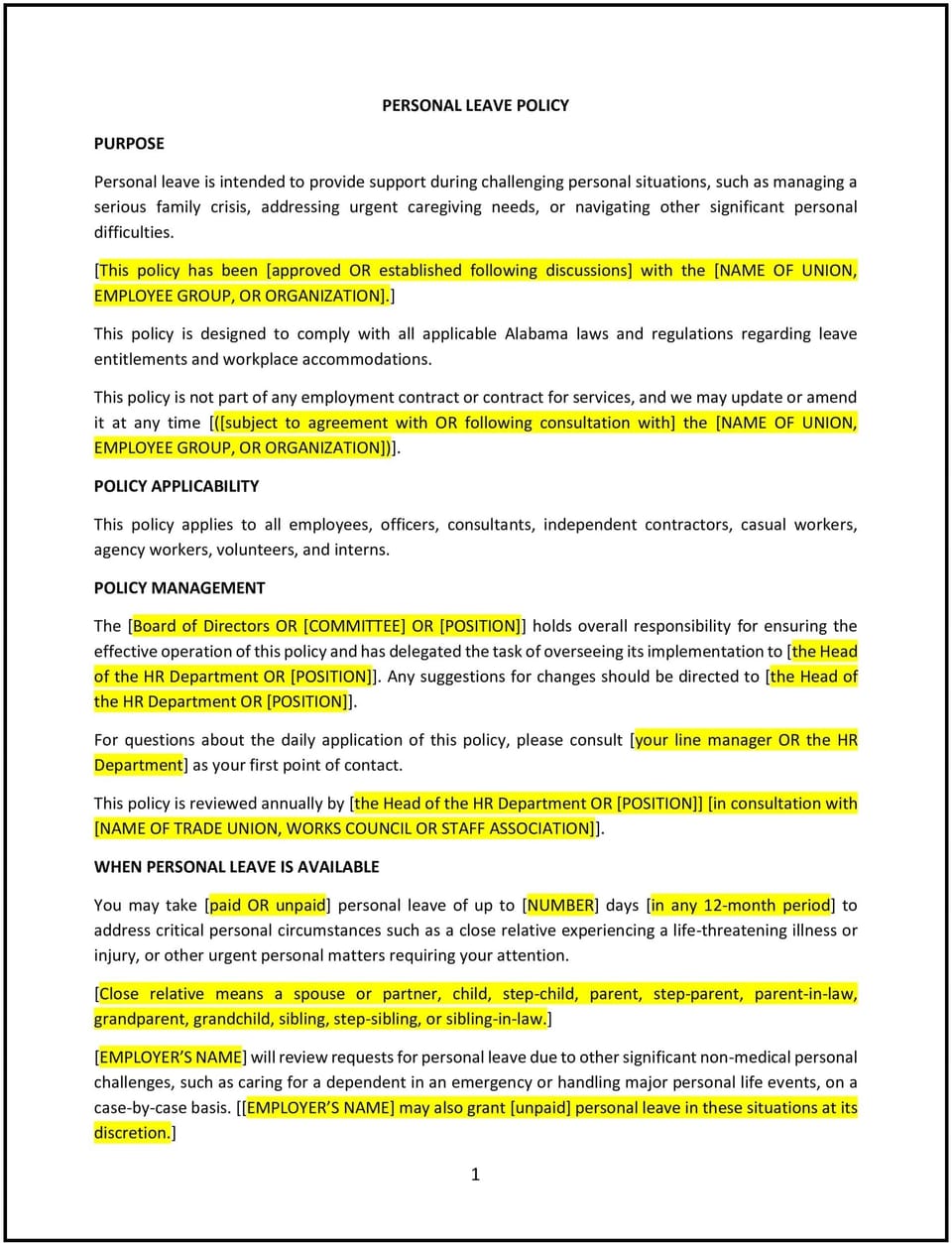Personal leave policy (Alabama): Free template

Personal leave policy (Alabama)
A personal leave policy outlines the guidelines for employees to take time off for personal reasons not covered under other leave policies, such as vacation or sick leave. For SMBs in Alabama, this policy ensures employees can address personal matters while maintaining clarity and consistency in managing leave requests.
This policy provides a framework for requesting, approving, and managing personal leave, helping businesses support their employees without disrupting operations.
How to use this personal leave policy (Alabama)
- Define personal leave: Specify what qualifies as personal leave, such as addressing family matters, personal development, or other non-work-related needs.
- Outline eligibility: Clearly state who is eligible for personal leave, including any employment duration requirements or other criteria.
- Detail the application process: Provide steps for employees to request leave, including the required notice period and necessary documentation.
- Specify leave duration: Define the maximum length of personal leave, whether it is paid or unpaid, and whether it can be extended.
- Include return-to-work procedures: Outline steps for employees to follow when returning from personal leave, such as providing updates or completing reorientation if necessary.
Benefits of using a personal leave policy (Alabama)
A personal leave policy supports employees while maintaining operational stability. Here’s how it helps:
- Encourages work-life balance: Allows employees to address personal matters without jeopardizing their job security.
- Promotes consistency: Ensures all leave requests are handled fairly and transparently across the organization.
- Reduces absenteeism: Provides a structured process for planned leave, minimizing unexpected absences.
- Enhances employee satisfaction: Demonstrates the company’s commitment to supporting employees’ personal needs.
- Protects business continuity: Establishes clear procedures to manage staffing during employee absences.
Tips for implementing a personal leave policy (Alabama)
- Communicate the policy: Include it in employee handbooks and discuss it during onboarding and team meetings to ensure awareness.
- Set clear expectations: Clearly outline eligibility criteria, documentation requirements, and the approval process to avoid misunderstandings.
- Monitor usage: Track personal leave usage to ensure it is being applied consistently and does not disrupt business operations.
- Provide flexibility: Where possible, accommodate reasonable leave requests to support employees’ personal needs.
- Review regularly: Update the policy as needed to reflect changes in company practices or feedback from employees.
Q: What qualifies as personal leave under this policy?
A: Personal leave typically covers non-work-related matters such as family obligations, personal development, or other important personal needs that are not addressed by other leave policies.
Q: Is personal leave paid or unpaid?
A: The policy determines this—personal leave may be unpaid, or employees might use accrued PTO or vacation time if allowed by the company.
Q: How should employees request personal leave?
A: Employees should submit a formal request to their manager or HR, including a clear reason for the leave and any necessary supporting documentation.
Q: How much notice is required for personal leave?
A: Generally, at least two weeks’ notice is required, but employees should give as much notice as possible in unplanned situations.
Q: Can personal leave be extended?
A: Extensions can be granted at the company’s discretion, depending on the specific circumstances and operational needs.
Q: Will employees retain their job during personal leave?
A: Job security during personal leave is subject to the terms of the policy, and companies will strive to accommodate reasonable leave requests whenever possible.
This article contains general legal information and does not contain legal advice. Cobrief is not a law firm or a substitute for an attorney or law firm. The law is complex and changes often. For legal advice, please ask a lawyer.


